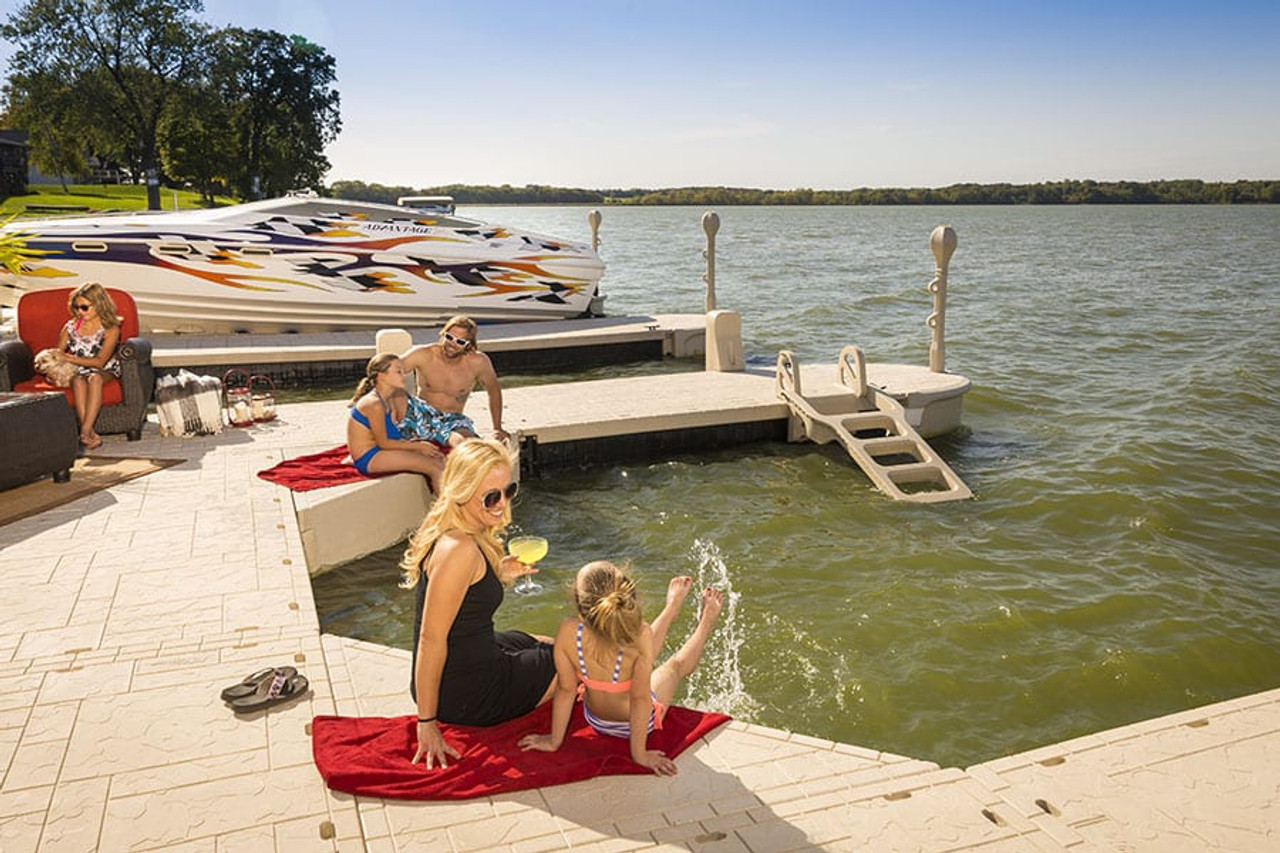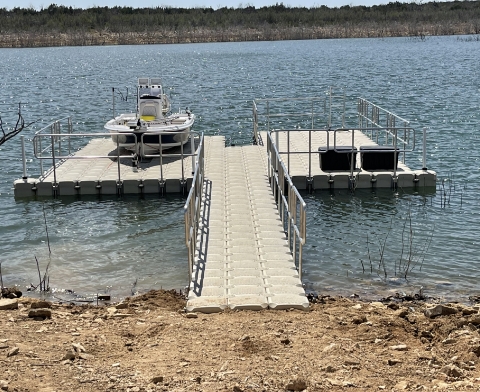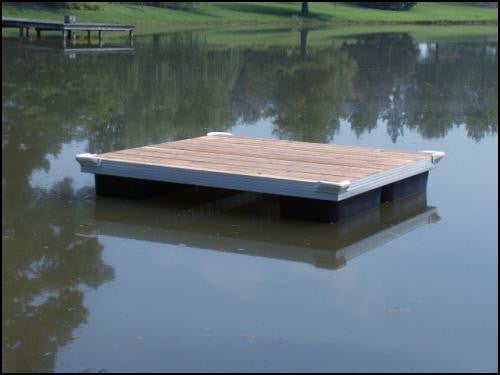The Ultimate Overview to Selecting the very best Floating Docks
Choosing the optimal floating dock calls for a thorough understanding of different elements that affect both performance and durability. Factors such as dock kinds, materials, and important features dramatically impact your decision-making procedure. Furthermore, factors to consider around setup and budget can further complicate the option. By examining these elements methodically, one can guarantee a financial investment that not only satisfies prompt needs however additionally enhances general residential or commercial property value. As we discover these crucial elements, it comes to be clear that the best options can bring about a useful and lasting service customized to your details requirements.
Comprehending Floating Dock Kind
When picking a drifting dock, it is important to comprehend the different kinds readily available, as each serves distinct purposes and applications. Floating docks primarily fall into three categories: modular, fixed, and pontoon docks.
Modular docks are made up of specific areas that can be conveniently constructed or reconfigured, making them ideal for changing water levels and varied usages, such as business procedures or leisure activities. Their versatility enables for personalization based on specific needs.

Pontoon docks are identified by their resilient framework, commonly made up of multiple pontoons that provide stability and support. They are especially fit for larger vessels and are commonly utilized in marinas or for waterside properties. Recognizing these kinds aids in choosing one of the most suitable floating dock to meet particular needs, guaranteeing optimum capability and security.
Key Materials for Durability
Choosing the ideal products for floating docks considerably effects their sturdiness and long life. The most typical materials consist of timber, plastic, steel, and composite materials, each offering unique advantages and constraints.
Wood, commonly favored for its aesthetic charm, needs routine maintenance to hold up against dampness and decay. Pressure-treated lumber can enhance resistance to rot, but it may still be at risk to pests and weathering.

Plastic docks, constructed from high-density polyethylene (HDPE), are resistant to rust, UV radiation, and effect, making them a popular option for coastal environments. Their lightweight nature also assists in easy installation and relocation.
Metal docks, commonly constructed from light weight aluminum or galvanized steel, give exceptional strength and resilience. They are resistant to deterioration, specifically when treated, yet might require additional insulation to avoid warm accumulation in hot environments.
Composite materials, incorporating timber fibers and plastics, deliver the advantages of both timber and plastic, standing up to wetness and fading while requiring very little upkeep. - floating docks
Ultimately, the option of materials should align with environmental conditions, planned usage, and upkeep choices to ensure the floating dock stays practical and aesthetically pleasing over time.
Important Features to Take Into Consideration
While the selection of products is vital, taking into consideration important functions for floating docks is similarly vital to make certain ideal efficiency and individual complete satisfaction. One vital attribute to examine is the dock's buoyancy ability, which identifies exactly how much weight it can sustain without immersing. dock company. This is vital for fitting watercrafts, personal watercraft, and even leisure activities
Additionally, mobility is a considerable consideration. Depending upon your needs, you might desire a dock that is easy to deliver and disassemble, especially if you prepare to move it seasonally. Security is an additional crucial function; a properly designed floating dock must minimize movement brought on by wind and water currents, giving a safe and secure platform for customers.
Safety and security functions, such as non-slip surface areas and rounded sides, are likewise important to avoid accidents, specifically in damp problems. Consider the schedule of accessories, such find as bumpers, cleats, and ladders, which can enhance the functionality of your dock.
Setup and Maintenance Tips
Establishing and keeping a floating dock calls for mindful preparation and interest to detail to guarantee its durability and optimal efficiency. Begin by selecting a suitable area that minimizes exposure to strong currents and waves, which can cause deterioration. Make sure that the water depth is adequate for the dock's elevation which it is secured firmly to stop activity.
Throughout installment, comply with the manufacturer's guidelines very closely, as incorrect setting up can endanger security. Usage high-quality materials immune to deterioration, such as light weight aluminum or treated wood, to improve durability. Routinely evaluate all parts, consisting of floats, connectors, and securing systems, for signs of damage or wear.
Upkeep is critical for expanding the life of your dock. Tidy the surfaces regularly to stop algae build-up and check for any loose fittings that might call for tightening. If your dock utilizes flotation tools, page guarantee they remain cost-free and intact from slits. Furthermore, take into consideration applying safety coatings to wood elements to decrease weathering impacts. By adhering to these installment and upkeep suggestions, you can appreciate a practical and reputable floating dock for several years to come.
Budgeting for Your Dock
Budgeting for your dock is a vital step that can dramatically influence your overall satisfaction and investment in a waterside residential or commercial property. Developing a clear budget aids you browse the numerous alternatives offered and guarantees you make informed decisions that line up with your financial capacities.
Begin by establishing the size and style of the dock you call for, as these elements will considerably influence the cost. Floating docks can vary significantly in price, relying on products, buoyancy, and features like devices and ramps. Research study different manufacturers and providers to compare costs and understand the market value.
In addition to initial expenses, think about ongoing costs such as upkeep, insurance policy, and potential repairs. Allot funds for these reoccuring expenses to prevent shocks down the line. It's also sensible here are the findings to spending plan for any essential permits or examinations, which may be called for by regional guidelines.
Lastly, keep in mind the prospective return on investment. A well-planned dock can improve your home's worth and appeal, giving a favorable financial impact in the long-term. By budgeting effectively, you can make certain that your dock satisfies your needs without jeopardizing your financial stability.
Verdict
In conclusion, choosing the optimal floating dock demands a thorough analysis of various elements, including dock kinds, materials, important attributes, and installment processes. Mindful consideration of financial constraints will additionally make certain a sound financial investment.

While the choice of products is vital, taking into consideration necessary features for floating docks is just as vital to ensure ideal performance and user contentment.Setting up and preserving a floating dock requires cautious preparation and focus to information to ensure its durability and optimal performance. Floating docks can differ significantly in cost, depending on products, buoyancy, and functions like ramps and accessories.In final thought, picking the excellent floating dock necessitates an extensive analysis of different aspects, consisting of dock types, materials, essential functions, and installment procedures.